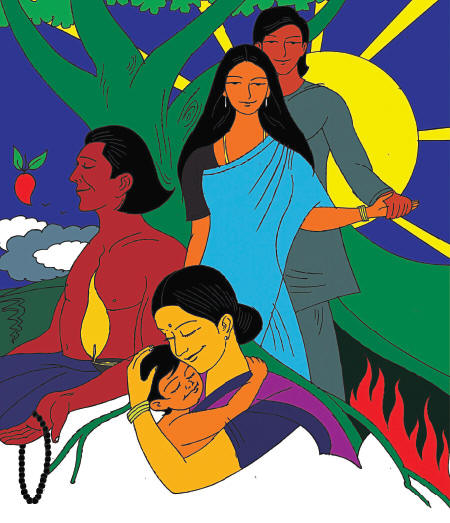TreeInTheSeed04
TreeInTheSeed04
Seed and Root
Dr. T.S. Narayanaswamy.
Images: Aras
 The
fruit that fell from the tree shattered and spread on the ground and one
seed fell on a above-the-ground root. The root challenged the seed, “Who
are you?”
The
fruit that fell from the tree shattered and spread on the ground and one
seed fell on a above-the-ground root. The root challenged the seed, “Who
are you?”
The root answered, “My friend, like you, I came out of a small seed. I
am the seed that grew into the sturdy main trunk that bears the
weight of the tree.”
The seed said, “You are the tree that made the fruit. I emerged from the
fruit. That being so, I am your baby.”
The root countered, “Certainly not. You gave me the form and the figure.
Therefore, you are my mother.”
These questions, posed over time immemorial, defied answers: “Did the
tree come from the seed? Did the seed come from the tree?”
It is akin to the question, “Did the egg come from the chicken? Did the
chicken come from the egg?”
If the seed is the mother, the tree is the infant.
If the tree is the mother, the seed is the baby.
If you know this, don’t you get a nebulous answer to the
unanswerable question?
The Body: The human body is made from a confluence of the Great
Elements. The mind: The mind suffers distress, bound by the sensory and
motor organs, web of desires, feelings… The
Intellect: It is subject to success and failure due to acts modulated by
the mind. The soul or
Āṉmā:
This peculiar entity, a self-propelling and dynamic force, activizes the
body, the mind and the intellect individually, collectively and
cooperatively.
This body is false.
It is just a windbag
Made by the illusory potter
Broken clay tile.
This body is impermanent and useless, as said by Siddhars.
Let us take the body first. Concurrent to the singing, ‘the body is
false,’ there were pathfinding elders who glorified the body as the
divine abode, deserving nurture.
Mei =
மெய் = Truth; Body.
‘Mei’ as a word (Homonym)
carries the meaning ‘Truth.’ Mei as a word also means the human
body. Why should the falsity of a body be named Mei, meaning
truth?
It is known to all living persons, the human body grows, gains strength,
gets fatigued, simply withers and dies. Every human being loves his or
her body very much. Man, through the medium of his body experiences
happiness and grief. The body (Mei):
Let us take the body first. Concurrent to the singing, ‘the body is
false,’ there were pathfinding elders who glorified the body as the
divine abode, deserving nurture. ‘Mei’ as a word (Homonym) carries
the meaning ‘Truth.’ Mei as a word (Homonym) also means the human
body. Why should the falsity of a body be named Mei, meaning
truth?
Mei
as a corporeal entity demonstrates the truth (Mei) derived
from the emotional experience of happiness and distress and therefore,
thought arises whether homonymous ‘Mei’ the decaying body stands
for truth. To comprehend our web of desires, the consequent
difficulties, and the needed coping mechanisms, knowledge about our body
is essential.
The number ‘Five’ and human body appear to have wonderful connection.
The body made of five Great Elements has five organs: body, Mouth, Eye,
Nose, and Ear. Among the
organs, the body has the tactile sense (Touch sense by the skin), the
medium of humanity’s experience of happiness and distress, the mental
agitation… Because of them, body’s tactile sense is first on the list.
Comforting the infant and helping him or her go to sleep, the mother
embraces the baby on the shoulders and pats the baby on its back.
Because of this maternal (mother-child) bond, both develop
happiness and mental satisfaction. On the other hand, the ill-effects
because of happiness and distress from touch sense should be taken
seriously.
-Let the tree grow.
To make the world proper…
The father was immersed in an important work.
His eight-year-old son came multiple times to his father
asking questions.
He posed research-type questions: “Why is the world round? Why does the
sun rise in the east? Why is sky blue?” This inquisitive intrusion bothered
him.
The father thought if he gave his son an assignment as a diversion, his
own work would not suffer. He showed him a drawing resting on the table. The
son said, “O, I know this! This is the world map. Our teacher showed us
the world map.”
His father cut the map into a jigsaw puzzle and spread the pieces hither
and thither. He told his son, “Take this jigsaw puzzle and stick them on
a paper so it looks like the map it was before. I have a prize waiting
for you.”
The father surmised, “This will
take a few hours even for a knowledgeable adult. My son won’t be able to
arrange the pieces properly and stick them with ease and in time.” The
son appeared before him in ten minutes with perfectly aligned pieces
stuck on the paper. His father was surprised at his feat.
The father inquired, “How did you put the pieces together so fast?”
The youngster said, “Father, your cut pieces had a man’s drawing on the
back. I put the man’s body parts together properly. The world map
appeared on its own accord without a flaw.” What a deductive reasoning.
‘See the man right, the world becomes right.’ Make the individual
aright. The world will become aright.’ The father understood that
principle through the incident.
